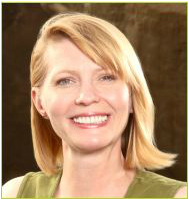 By Catherine Richardson, Ph. D. You’ve been meditating daily. You’ve been going to yoga five times a week. You repeat mantras in the shower while opening your chakras through visualization. You systematically pray for peace, love, compassion, and a healthy planet. You follow and “like” the posts of every New Age author on FaceBook. You haven’t eaten meat in months. You even quit watching football so as not to expose yourself to the energy of violence. You’re nice to people, and they’re nice to you in return. You’ve started to feeling as if you really are living in that post-2012 ascension energies you read about in The Magic of Being. So what just happened? A driver ran a stop sign and nearly hit you as you were bicycling to aromatherapy class. Instead of apologizing, the driver yelled something unkind about the size of your buttocks and gave you the finger as she drove away. Shaking from anger and adrenaline, you responded in kind—complete with your own one-fingered salute and some NC-17 phrases you didn’t even realize you knew. And before you realized it, you were suddenly fantasizing about firing a bazooka into the rear window of her car. You have never acted quite like this in your entire life. In fact, you consider yourself way too evolved to even be capable of such thoughts and behavior. You ride home confused, ashamed, and feeling like a failure. Renowned Swiss psychiatrist and metaphysical philosopher Carl Jung would likely say that your shadow just asserted itself. According to Jung, the shadow represents the aspects of the Self that are outside your conscious awareness, as well those parts that don’t fit into who you believe you are or who you want to be. The shadow is the unacceptable and primitive side of your personality. And when your conception of Self is…say…extremely restrictive (i.e. “I always act from a place of compassion and love, rather than fear and judgment.”), more and more of who you are becomes part of the shadow because it is repressed, rejected, or denied. Most people have an ideal of what a spiritual person should be; and it does not involve cursing, the use of the middle finger as an insult, or visualizing second-degree murder. Most of us think of spiritually evolved people as gentle, kind, compassionate, and wise. They are always composed. They are never depressed, angry, or anxious. They think only positive thoughts and say only thoughtful and positive things. The primary emotion they feel is love, which is evidenced by their perpetual benevolent smiles. Most of us have been taught to regard Jesus, Buddha, Krishna, Mohammad, or other seminal religious figures in this way. For many of us on a serious spiritual path, these luminaries are our role models. Many religions teach that merely having certain thoughts is sinful. Likewise, some prominent New Age teachers instruct us to focus only on the positive in thought, word, and deed; according to the law of attraction, this practice will bring more good things into our lives. Conversely, focusing on the negative may bring unhappiness, illness, or financial struggles. Nonetheless, according to Jung, the repressed shadow can and eventually will break through in disturbing and often shocking ways, the least of which being an unexpected loss of temper with a reckless motorist. Theologian and mystic Michael Clark, Ph.D., writes that a repressed shadow may account for some Catholic nuns’ cruel treatment of school children, as well as the high incidence of pedophilia among Catholic priests and monks. These particular professions carry a very narrow definition of what is acceptable in both thought and behavior. With no healthy outlet, the shadow lurks beneath the surface, slowly building up a head of steam. It eventually seeps or bursts through the psyche in distorted and appalling ways. The shadow can also lead to the unconscious projection of your unacceptable or repressed aspects onto other people. This is commonly referred to as scapegoating. Jung believed that such projections, taken to their extremes, could be dangerous. Perhaps the starkest example of the shadow run riot is seen in the terrifying figure of Adolf Hitler. According to Jung, the supposed evils Hitler saw in the Jewish people were simply projections of his own shadow qualities and impulses. Overwhelming evidence now indicates that Hitler himself was Jewish, lending even more credence to Jung’s theory. And, according to Jung, Hitler was completely unaware of the pervasive hold his shadow had on him. Jung believed that whenever self-righteousness, intolerance, and hate are combined, that the hater is projecting his or her shadow on the hated. With the escalating global clash between Islamic extremists and Western society, the lessons of the shadow merit special attention. When one group completely demonizes another, the hope for mutual understanding, compassion, and compromise perishes. If the shadow can be this volatile, how can we avoid these perils? First of all, while the great spiritual masters may come across as detached from their impulses and emotions, none of them preached that we must detach ourselves from life itself. For example, while Buddha did spend much of his life meditating and denying himself worldly pleasures, he ultimately emerged from these years of deprivation to teach us to engage in life fully. His philosophy was virtually the opposite of detachment; he taught that we should be mindful of our thoughts and actions. Buddha’s mindfulness is quite different from attempting to banish certain thoughts and impulses. Mindfulness involves complete and total awareness of the whole mind and body in the present moment—paying close attention to our thoughts and impulses—without judgment. It’s not about control, but rather about openness and honesty with oneself. This is simply not possible if we refuse to acknowledge much of who we are. Denying or rejecting whatever you perceive as negative, unspiritual, or profane within yourself makes mindfulness impossible. Often what really motivates and makes you tick is being jammed back into the unconscious. How is personal and spiritual evolution possible in this state? Jung’s answer is not unlike Buddha’s. Jung prescribed integrating the shadow into a more fully-developed Self. He recommended fostering a more constructive and conscious relationship with the shadow by bringing it out into the light—being willing to examine, without judgment, what makes you tick. Acceptance and even appreciation of the whole Self is a crucial step in this process. Likewise, letting your shadow out in more conscious, healthy ways can also be helpful. For example, direct your aggressive impulses into playing sports (even football!) or exercise; or release your more troubling thoughts and feelings through art, music, or creative writing. These are all ways to get more in touch with your shadow, and eventually integrate it into your personality. Many of the modern mystics who teach about the law of attraction also acknowledge the need to accept and integrate all parts of the Self. Neale Donald Walsch, author of the best-selling series Conversations with God, writes: “I have now come to understand the extraordinary importance of leading an integral life. That is, of allowing myself to notice, then to blend, all the aspects of who I am—those that I and others called ‘positive’ and those that I and others have called ‘negative’—into a grander Whole.” Likewise, Deepak Chopra writes: ”The path to enlightenment includes not only the search for the divine but also the total acceptance of the shadow self.” Oftentimes, troubles with the shadow begin with having an overly-strict ideal of who you should be, and how you should think and behave. While it is certainly laudable to have spiritual aspirations and a strong system of values, cut yourself some slack! Allow yourself to be human. Be flexible and allow your energies to flow. Even your role most cherished role models had some rough patches. For example, many of us like to contemplate fondly upon the compassionate Jesus who forgave his enemies and healed folks from all walks of life; but according to the Scriptures, Jesus was at times overcome by what we think of as the more negative emotions. He wept at the death of Lazarus; and he is depicted as angrily throwing the money-changers out of the temple while knocking over their tables and chairs. Scripture even describes him as “making a whip of cords” to assist in this endeavor. The guy sounds pretty mad to me. As in the case of Jesus, getting mad is not always a bad thing. In fact, the shadow houses our primitive survival instincts, which can be helpful in a very direct way in moments of real, physical danger. Anger and fear can trigger the release of adrenaline and other hormones, which in turn may help us protect ourselves and our loved ones in emergencies. All of these suggestions are echoed in much of the spiritual guidance being shared in the 21st-century. Within the articles of The Magic of Being are numerous channeled messages emphasizing unity and acceptance of Self and others over dualistic concepts such as “good versus evil”. My most recent channeled message in The Magic of Being states: “We ask you to fully accept and embrace all parts of yourself, including what you perceive as bad or negative—for the God frequency means wholeness and unity both with the outer Universe and within yourself.” Please remember, the spiritual journey is also a journey of self-discovery, and it continues throughout your lifetime. Exploring and integrating your shadow can be a wonderful catalyst for understanding yourself and others on many levels. Be willing to open up to all of the beauty and majesty that is You, and you just might recognize the God within! You may also like An Interview with Catherine Richardson
1 Comment
|
Loading... Authors
All
Archives
February 2023
|




 RSS Feed
RSS Feed
